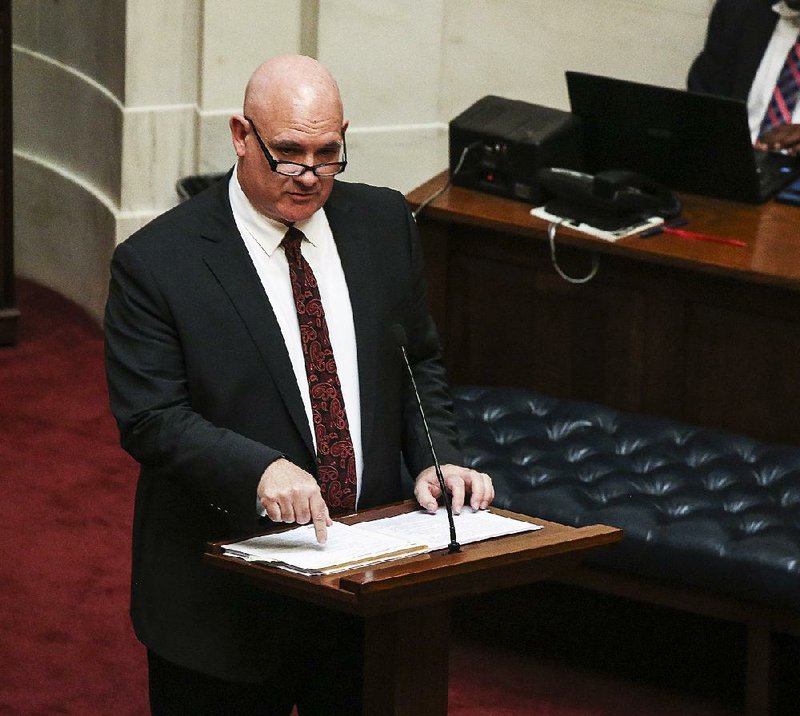The Arkansas Senate on Monday took the final steps needed to refer to voters in 2020 a proposal that would make it more difficult for Arkansans to qualify proposed initiated acts and constitutional amendments for later ballots.
The Senate voted 25-10 to approve House Joint Resolution 1008 by Rep. DeAnn Vaught, R-Horatio, which would place the measure -- itself a proposed constitutional amendment -- on the general election ballot. No action is required by Gov. Asa Hutchinson.
Sen. Mathew Pitsch, R-Fort Smith, told senators that the proposal "is designed to protect the people of Arkansas' rights and to ensure citizens' initiatives are genuinely citizens' initiatives, and not special interest purchases."
According to Pitsch, the proposal was developed with input from a wide range of people: lawyers and staff members from the state Board of Election Commissioners; the offices of the governor, attorney general and secretary of state; and Bureau of Legislative Research, "so we'll be able to stand the scrutiny and legal challenges" and still protect the Arkansas Constitution.
The proposed constitutional amendment in HJR1008 would require initiative petitions to have a certain percentage of valid signatures of registered voters from each of 45 counties. The designated percentage would be based on the votes in each county in the most recent gubernatorial election. The constitution now sets that minimum at 15 of Arkansas' 75 counties.
[RELATED: Complete Democrat-Gazette coverage of the Arkansas Legislature]
Sen. Will Bond, D-Little Rock, pointed out that the proposal would triple the number of counties in which sponsors of ballot measures have to obtain a certain number of signatures. He said that's a significant increase of work required to get on the ballot.
But Pitsch said one of the nation's founding fathers indicated that "when you have a petition drive, it needs to be a broad-based appeal.
"When you take 15 out of 75 counties, the people working on this amendment did not feel that, like, was a broad-based appeal," he said.
Bond said the proposed amendment would make it significantly more difficult for "regular everyday folks" to get their initiated measures on the ballot, while "those with substantial assets could still be on the ballot."
Pitsch said he disagreed with that.
The Legislature's proposed constitutional amendment still would allow proposals with "broad-based appeal" to qualify for the ballot, he said.
Randy Zook, president and chief executive officer of the Arkansas State Chamber of Commerce, last week testified for the measure before a Senate committee, while Jerry Cox, president of the Family Council, opposed the proposal.
Cox told the Senate committee there have been only five citizens initiatives approved during the past 22 years and "the rest of them came from here," referring to proposals from the Legislature.
But Pitsch said, "If you look at what has happened in the last two [election cycles], those have come predominantly from petition drives."
HJR1008 would:
• Require a three-fifths vote of the 35-member Senate and 100-member House to refer a proposed constitutional amendment to voters. Currently, a majority vote in both chambers is required.
• Require initiative petitions for statewide measures to be filed with the secretary of state by Jan. 15 of the year they would be voted on. They are now required to be filed by four months before the election.
• Require a challenge to the sufficiency of a statewide ballot measure to be filed no later than April 15 of the year of the general election in which the ballot measure will be voted on.
• Eliminate the 30-day cure period, which now gives more time for signature gathering if the sponsor of a proposed ballot measure falls short on valid signatures but turns in at least 75 percent of the required number.
The House and Senate already have voted to refer to voters in the 2020 general election two other proposed constitutional amendments. In each regular session, the Legislature can refer up to three proposed amendments to the next general election ballot.
One of the other two would limit state lawmakers elected several years from now to serving a dozen consecutive years before requiring them to take a four-year break from legislative service. The measure is Senate Joint Resolution 15 by Sen. Alan Clark, R-Lonsdale.
Under SJR15, state lawmakers elected after Jan. 1, 2021, would be limited to 12 consecutive years in the House, Senate or both. Two-year Senate terms related to redistricting would be included in that total. After the four-year break, former lawmakers could run again.
Also under the resolution, lawmakers now in office, who are limited to 16 years (or more with two-year terms in the Senate as a result of redistricting) would be eligible for subsequent service in the General Assembly once they are out of office for four years.
The House and Senate also have approved referring to the 2020 general election ballot a proposed constitutional amendment that would permanently extend the half-percent sales tax for highways approved by voters in 2012 for a 10-year period. That's House Joint Resolution 1018 by Rep. Jeff Wardlaw, R-Hermitage.
A Section on 04/09/2019

